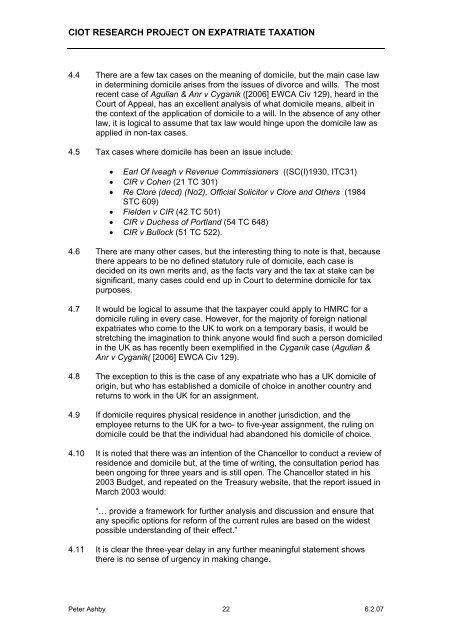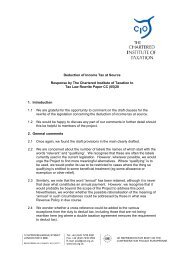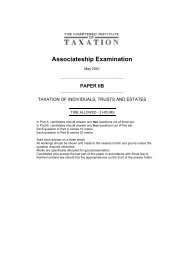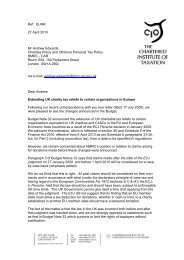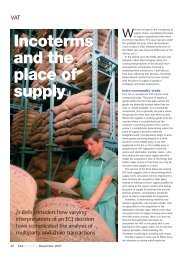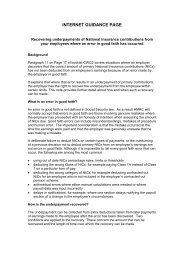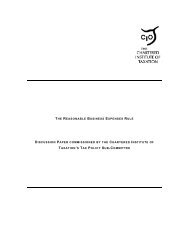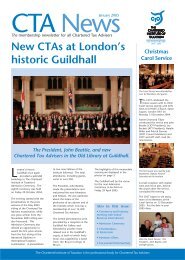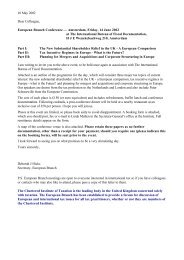Expatriate taxation - CIOT - The Chartered Institute of Taxation
Expatriate taxation - CIOT - The Chartered Institute of Taxation
Expatriate taxation - CIOT - The Chartered Institute of Taxation
Create successful ePaper yourself
Turn your PDF publications into a flip-book with our unique Google optimized e-Paper software.
<strong>CIOT</strong> RESEARCH PROJECT ON EXPATRIATE TAXATION<br />
4.4 <strong>The</strong>re are a few tax cases on the meaning <strong>of</strong> domicile, but the main case law<br />
in determining domicile arises from the issues <strong>of</strong> divorce and wills. <strong>The</strong> most<br />
recent case <strong>of</strong> Agulian & Anr v Cyganik ([2006] EWCA Civ 129), heard in the<br />
Court <strong>of</strong> Appeal, has an excellent analysis <strong>of</strong> what domicile means, albeit in<br />
the context <strong>of</strong> the application <strong>of</strong> domicile to a will. In the absence <strong>of</strong> any other<br />
law, it is logical to assume that tax law would hinge upon the domicile law as<br />
applied in non-tax cases.<br />
4.5 Tax cases where domicile has been an issue include:<br />
• Earl Of Iveagh v Revenue Commissioners ((SC(I)1930, ITC31)<br />
• CIR v Cohen (21 TC 301)<br />
• Re Clore (decd) (No2), Official Solicitor v Clore and Others (1984<br />
STC 609)<br />
• Fielden v CIR (42 TC 501)<br />
• CIR v Duchess <strong>of</strong> Portland (54 TC 648)<br />
• CIR v Bullock (51 TC 522).<br />
4.6 <strong>The</strong>re are many other cases, but the interesting thing to note is that, because<br />
there appears to be no defined statutory rule <strong>of</strong> domicile, each case is<br />
decided on its own merits and, as the facts vary and the tax at stake can be<br />
significant, many cases could end up in Court to determine domicile for tax<br />
purposes.<br />
4.7 It would be logical to assume that the taxpayer could apply to HMRC for a<br />
domicile ruling in every case. However, for the majority <strong>of</strong> foreign national<br />
expatriates who come to the UK to work on a temporary basis, it would be<br />
stretching the imagination to think anyone would find such a person domiciled<br />
in the UK as has recently been exemplified in the Cyganik case (Agulian &<br />
Anr v Cyganik( [2006] EWCA Civ 129).<br />
4.8 <strong>The</strong> exception to this is the case <strong>of</strong> any expatriate who has a UK domicile <strong>of</strong><br />
origin, but who has established a domicile <strong>of</strong> choice in another country and<br />
returns to work in the UK for an assignment.<br />
4.9 If domicile requires physical residence in another jurisdiction, and the<br />
employee returns to the UK for a two- to five-year assignment, the ruling on<br />
domicile could be that the individual had abandoned his domicile <strong>of</strong> choice.<br />
4.10 It is noted that there was an intention <strong>of</strong> the Chancellor to conduct a review <strong>of</strong><br />
residence and domicile but, at the time <strong>of</strong> writing, the consultation period has<br />
been ongoing for three years and is still open. <strong>The</strong> Chancellor stated in his<br />
2003 Budget, and repeated on the Treasury website, that the report issued in<br />
March 2003 would:<br />
“… provide a framework for further analysis and discussion and ensure that<br />
any specific options for reform <strong>of</strong> the current rules are based on the widest<br />
possible understanding <strong>of</strong> their effect.”<br />
4.11 It is clear the three-year delay in any further meaningful statement shows<br />
there is no sense <strong>of</strong> urgency in making change.<br />
Peter Ashby 22 6.2.07


